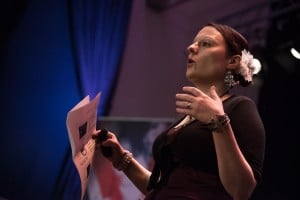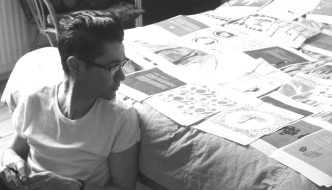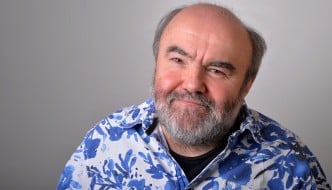
We writers know that in the fickle world of word-slinging good advice is hard to find. For script writers and novelists, one of the best resources out there is www.Bang2Write.com run by Yorkshire-born writer, script editor and all round awesome lady, Lucy V Hay. We caught up with her to discuss the most common mistakes in new screenplays, script structure and working with Danny Dyer.
You have written several books, both fiction and non-fiction. And you work as a script editor for film. Which do you prefer, writing or editing, and why?
That’s a tough question. I love writing, except when I don’t – such as when I’m stuck! I think with script editing it depends on the day, the project AND the writer. I love it when I’m working with a writer who “gets” that I am a facilitator, NOT the rewriter of their screenplay. Some writers are very needy and I never mind that, but some writers won’t do their prep work at foundation level and then run into obvious pitfalls because their central concept is misfiring. That can be very frustrating. Ultimately I am blessed because I love what I do.
Have you written scripts too?
Yes, I used to write screenplays but as I went up the ladder from script reading into script editing, I found I needed to make a choice. Writing my own screenplays after working on other people’s began to feel like a Busman’s Holiday. Life is too short to not enjoy what you do, so I needed to discover a way of writing I liked again; that’s why I started writing novels. Also, there are only so many hours in the day!
You were involved in the recent film, Assassin, with Danny Dyer. How did that come about and what was your role in that project?
I’ve been involved with ASSASSIN ever since it was UNTITLED HITMAN PROJECT, years ago! I met the writer/director JK Amalou back in 2005 and we really hit it off. I love reading his screenplays and working with him, he makes the process so easy. I’d work with him on pretty much anything, but luckily I love hitman thrillers, so the choice to get involved in ASSASSIN was an easy one.
I’m a fan of your book, Writing And Selling Drama Screenplays. What prompted you to write that? Was there something specific that you felt was missing from other screenwriting books that you felt you had to put out there?
I wrote an article for The London Screenwriters’ Festival website on writing drama screenplays and got such a huge response to it: writers sent me emails, tweets and messages about it by the ton! One thing loads of them said was, “We need more on this, there’s nothing like this out there.” This got me thinking… I find there is a deep misunderstanding of what drama is, in the spec pile. Not just with new writers either, but veterans sometimes. Drama can literally be ANYTHING, yet writers will recycle the same-old, same-old over and over again. The UK is known for great drama movies, shorts and television, yet writers seem to believe it’s got to be all GRITTY ISSUES and tower-blocks. This couldn’t be further from the truth! There’s a hugely rich variety of personal stories out there and I wanted writers to realise this. The response to the book has been overwhelmingly positive, especially because I tried to concentrate on marginalised voices and stories in the book – female directors, writers from BAME backgrounds and so on. I’ve had many emails telling me screenwriters and directors have felt inspired to tell their stories. That’s a bit of a dream come true for me. That’s what B2W is all about.

Your website, www.bang2write.com is full of great advice for writers, if you had to choose one single piece of advice for people to take away from this interview, what would it be?
Concept is king (or queen). If the seed of your story does not work at foundation level, literally nothing else will. Put your work into the concept and everything else will follow.
You read a lot of scripts. What is the one mistake you see more than any other?
Writers write waaaaaaaaaay too much dialogue. Literally chains and chains of it. As a result, the screenplay is not visual, yet scripts are visual mediums, so this is a massive own goal. Even a “talky” script probably doesn’t have as much dialogue as the writer thinks it does, plus the likes of Aaron Sorkin and any other famous screenwriter feted for their dialogue can do it ALL, not just the talky bits. It’s time screenwriters got real on this issue and really invested in their visuals. It’s the only way forwards.
What are you working on currently?
I’m currently putting the finishing touches to a crime novel.
Are you ever going to do a talk ‘up north’? (Ok, maybe that question comes directly from me!)
Well I was actually born in Scarborough, so I’d love to come back “Oop North” to do a talk! I’ve done talks in many different places now other than London and the South West. This includes Frankfurt, Germany, Wales and even the tiny village of Eye in the UK, so if any organisations want to partner with me to do this, they should contact me.
What film would you recommend as a good example of excellent script structure?
Hollywood gets a lot of flack, but most American movies really “get” structure. In Writing & Selling Drama Screenplays, I cite Noel Clarke’s KIDULTHOOD as being particularly good at calling forth this type of lean structure, plus HOURS starring the late Paul Walker. Of more recent movies, I think Dan Gilroy’s NIGHTCRAWLER was excellent at structure. All the set ups and pay offs were just in the “right” place for ultimate dramatic satisfaction as far as I was concerned.
You are a published author, professional script reader and also work on feature films. Give the rest of us hope, what are you really bad at?
I live almost exclusively inside my head, which means I’m totally rubbish at anything “normal”. I can’t drive, I can’t find my way anywhere and I’m always late for everything – or stupidly early. There are no in-betweens with me, it’s one or the other!
Filed under: Written & Spoken Word
Tagged with: Bang2Write, leeds, Lucy V Hay, scripts, writing, Writing & Selling Drama Screenplays, yorkshire



Comments